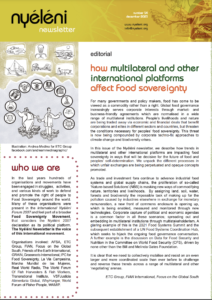19/12/2023
Under: Asia/World, Food Sovereignty and Agroecology, Publications
For many governments and policy makers, food has come to be viewed as a commodity rather than a right. Global food governance increasingly serves corporate interests through market- and business-friendly agreements which are normalised in a wide range of multilateral institutions. People’s livelihoods and nature are being traded away via economic and financial deals that benefit corporations and elites in different sectors and countries, but threaten the conditions necessary for peoples’ food sovereignty. This threat is now being compounded by corporate techno-fix approaches to climate change and biodiversity crises.
In this issue of the Nyéléni newsletter, we describe how trends in multilateral and other international platforms are impacting food sovereignty in ways that will be decisive for the future of food and peoples’ self-determination. We unpack the different processes in which unfair exchanges are being perpetuated and opaque concepts promoted.
As trade and investment fora continue to advance industrial food systems and global supply chains, the proliferation of so-called ‘Nature-based Solutions’ (NBS) is masking new ways of commodifying nature, territories and livelihoods. By assigning land, soil, water, forests and biodiversity the impossible task of making up for the pollution caused by industries elsewhere in exchange for monetary remuneration, a new front of commons enclosure is opening up, which is being enabled, measured and monitored through new technologies. Corporate capture of political and economic agendas is a common factor in all these scenarios; spreading out and embedding in multilateral institutions through multistakeholderism. A glaring example of this is the 2021 Food Systems Summit and the subsequent establishment of a UN Food Systems Coordination Hub, which seeks to hijack the ongoing food governance conversation. A further example is the discussion on Data for Food Security and Nutrition in the Committee on World Food Security (CFS), driven by none other than the Bill and Melinda Gates Foundation.
It is clear that we need to collectively mobilise and resist on an even larger and more coordinated scale than ever before to challenge and reverse these trends across a range of multilateral and other ‘negotiating’ arenas.
ETC Group, FIAN International, Focus on the Global South
Click here to download the English edition (pdf)






